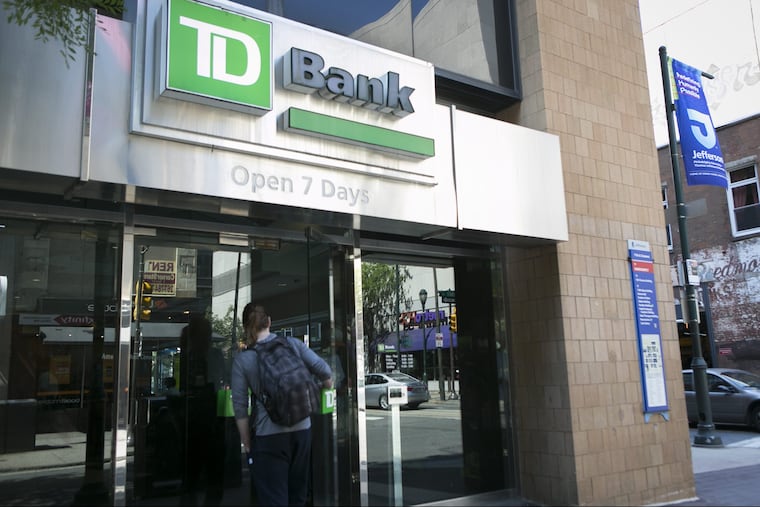TD Bank customers feel short-changed by ‘Penny Arcade’ settlement
An April 2016 Today Show report found TD Bank's machines repeatedly undercounted coins. A law suit has been settled but customers are seeing tiny sums like $2 for the undercounts and are complaining about the math.

Anthony Parisi Sanchez dumped socks full of change into TD Bank's Penny Arcade coin-counting machine every week for six years, turning hundreds of dollars' worth of pennies, nickels, and dimes into what he assumed would be the same amount in cash.
But media reports found the bank was undercounting the change. And this year TD Bank settled a class action case alleging that the machines had shorted consumers across the country.
Parisi Sanchez, a 50-year-old Vineland, N.J., resident, said he got just two additional bucks in the settlement. And he thinks he got robbed.
"This was a major deceit on the part of TD Bank, and I know I lost more than $2," he said Friday.
Parisi Sanchez is one of roughly 5.1 million Penny Arcade users whom TD Bank is paying this year as part of the $7.5 million settlement to resolve eight class action complaints. Like Parisi Sanchez, many consumers are getting single-digit payments. This reporter received $3.10.
That's because class members are getting 26 cents for every $100 they made in Penny Arcade transactions under a formula used to distribute the settlement money. Individual payments are calculated by multiplying 0.26 percent to the total amount a customer collected from the machines between April 11, 2010, and July 12, 2017, according to a notice of the settlement, which was approved in January.
Attorneys from eight firms representing class members, meanwhile, earned $1.9 million in legal fees from the case, money paid separately by TD Bank that did not reduce class members' recovery. In addition, 13 named plaintiffs in the case shared $65,000 that was also not included in the $7.5 million figure. Stephen DeNittis, an attorney who represented class members, said the plaintiffs got $5,000 each to "encourage people to come forward in a case like this."
The class action claims stemmed from an April 2016 NBC Today report that found TD Bank's machines repeatedly undercounted coins. In one instance, a Penny Arcade counted $300 worth of coins as $256.90 — a nearly 15 percent error. Today tested five Penny Arcade machines in total, with the other four units under-counting coins by substantially smaller rates, ranging from 0.0167 percent to 1.24 percent.
TD account holders got their change counted free but outsiders paid an 8 percent fee for the service.
The bank yanked the machines out of its branches after the report was published and agreed to no longer use them as part of the settlement.
Coin-counting machines can still be found at Republic Bank, and Coinstar has kiosks in grocery and retail stores. The Today report said Coinstar's machines delivered accurate counts.
The 0.26 percent multiplier used to calculate class members' payments is based on machine error rates found during tests conducted by experts.
According to court filings, TD Bank hired Deloitte Transactions & Business Analytics to test its Penny Arcade machines. The bank tested more than 1,000 machines representing 90 percent of all units, and the machines net undercounted by 0.117 percent and 0.09 percent, respectively, in two separate trials. Net undercount rates include overcounts, in which the machines count more coins than are actually deposited.
A TD Bank spokesperson declined comment, citing pending litigation.
Attorneys representing class members said their own experts reviewed Deloitte's data and methodology and concluded it was reliable to use as a basis for the settlement, according to court filings.
DeNittis acknowledged there were some outliers during machine testing, but said their own experts' tests on 19 machines found an average undercount rate of about 0.28 percent. He said that margin of error did not factor in overcounts.
The $7.5 million settlement figure was calculated by applying the 0.26 percent rate to the total amount of coins counted during the seven-year class period, DeNittis said.
DeNittis, a managing partner at the law firm DeNittis Osefchen Prince PC, based in Marlton, described the settlement as the best possible outcome given that it's impossible to pinpoint how much each person lost.
"The class received at a minimum 100 cents of the calculated losses through statistical sampling and testing," he said, adding that overcounts were not considered in the rate used for the settlement.
But Parisi Sanchez isn't satisfied with his two dollars. "There's no way they could tell how much people lost," he said, calling the methodology used for the settlement "gorilla math."
"I'll use it on stamps to sue them," he said of his plans to spend the $2.
By receiving those two bucks, however, he waived the right to take legal action against TD Bank, according to a notice of the settlement.